It is a sad reality that a great many supremely gifted musicians did not have careers that their talent might have warranted, with some of these great musicians having had to face some tremendous adversity. One such artist was Marian Filar, a wonderful Polish pianist who endured the horrors World War 2, not only surviving years in concentration camps but going on to play internationally to great acclaim, including at Carnegie Hall and under leading conductors. This great musician’s career unfortunately did not develop as one might have hoped and today he is less remembered due to his having made but a handful of commercial recordings. As the testimonials of great musicians and recorded performances included in this posting will demonstrate, he was indeed an artist of outstanding capabilities – and his life story too reveals that he was a remarkable human being.
Marian Filar was born in Warsaw on December 17, 1917. His was a musical family and he showed his aptitude at a young age, sneaking into his sister Helen’s piano lessons at the age of four. “I fell in love with the piano instantly. It made the most glorious sound in the world, the most magnificent I had ever heard. I was hooked. From then on I was married to the piano.” When it was discovered that the young boy had perfect pitch, his parents were convinced that he should be professionally trained but they started him on the violin like his two brothers (his two sisters played piano), which led to such tantrums that they acquiesced and arranged for him to study the instrument he loved. At age six, he gave his first performance at the conservatory – because he didn’t know it was rare to do so, he wasn’t nervous (“You don’t learn to get nervous until you’re older”). He had some early lessons with the legendary Aleksander Michałowski and Chopin Competition founder Jerry Zurawlew.
Aged 12, he played the Mozart D Minor Concerto in an audition for the Warsaw Philharmonic which so impressed the conductor that he was immediately booked to play the work in concert. The great German pianist Alfred Hoehn attended one of the young boy’s performances and entered discussions with the family about training him; however, because of ‘the Hitlerites’ in Germany, he suggested that Filar study at the local conservatory until the situation there settled down (Hoehn seemed to think it would blow over in a few months) and that he would stop by to check on the boy whenever he visited Warsaw. Thus the young Pole started training with the esteemed Professor Zbigniew Drzewiecki, who seems to have been as famous for his yelling in lessons as he was for his playing and teaching. While the first summer with him was challenging, Filar soon came to appreciate his teacher and the connection was beyond cordial: Drzewiecki would later be of vital support during the horrors of the war, managing to get some precious items smuggled to Filar while he was imprisoned in a concentration camp.
Young Marian was involved in more than just musical training, being physically active and playful like his peers while also deeply immersed in the musical culture. He attended concerts by Hofmann (“we all fell out of our chairs”), Gieseking, Backhaus, Hoehn, Landowska, and many others, in addition to symphonic concerts. As he continued his studies, he was told that the rise of anti-Semitism would limit his possibilities in Poland and that he should go abroad, but his parents couldn’t afford it at the time. He had been rather sheltered from these issues, though he started observing incidents – including with government officials dealing with his father – and his mother sent one of her oldest sons to Palestine in 1935 in case the family would later need to leave.
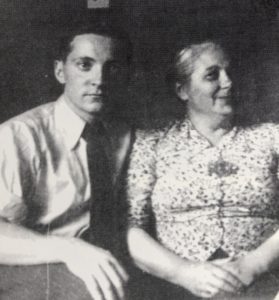
Filar’s autobiography From Buchenwald to Carnegie Hall is remarkable for the first-hand detail given about the musician’s experiences during the War – indeed, the American Library Association magazine Booklist wrote that “among the many astonishing accounts of Holocaust survival, this is one of the most remarkable” and I cannot recommend reading the book yourself to get all the details, as his incredible story is told with such directness and clarity. The young man’s ingenuity, fierce intelligence, and compassionate nature would be channeled from music-making into helping his friends, family, and compatriots to survive. He tells stories of local bombings, of the creation of the Jewish ghetto in Warsaw, of witnessing – while hiding behind a wall in the conservatory – Russians registering locals to be sent to Siberia. His strength of character and astuteness were evident in how he handled some very difficult situations, among them Russian soldiers attempting to claim property and take advantage of women. Once the Germans began narrowing in on citizens, he cleverly arranged for trash to be piled up near the entrances of their homes to make the area looked more derelict so they would be less likely to be searched.
With a combination of resourcefulness, daring, and good luck, Filar escaped many close calls: he made a gutsy escape while being marched to be taken away and several times saying just the right thing to the wrong person to get out of some very sticky situations. But eventually he was loaded into a train and shipped to the camps. Even here, his observation skills served him well: seeing how crowded the cars would be, he went straight to the window as soon as he entered the carriage so he would have air during the arduous journey (his instincts were right: several people perished en route due to not being able to breathe properly). Inside the camps, malnutrition and heavy work led to more close calls but he soon figured out how the black market worked inside the camps and found ways to get extra food from local workers so he could regain his strength. There were multiple times when he could have been shot on the spot but luck was truly on his side. His mindset and determination were clear:
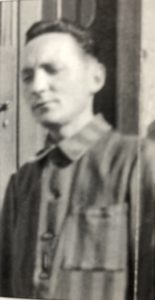
“As much as they beat and humiliated us, I knew they could not take away my talent, my gifts, my knowledge, my love of music what I am. To them I was only a number, a slave. They know nothing about me, which was just as well. Even without a piano I always had music in my heart, which is why I never thought of suicide, no matter how bad things got. Plus, I wouldn’t have wanted to give those SS bastards the satisfaction of thinking they had triumphed over me.”
After two years spent in seven camps, Filar was liberated, but his parents and sister Helen had all been killed by the end of the war. Soon after gaining his freedom, he and his brother went to Prague, where the city was being accommodating to refugees. Filar was thrilled to see a poster announcing a concert, and upon hearing that the conductor was the son of violinist Jan Kubelik, he went to the rehearsal and afterwards introduced himself to Rafael Kubelik. He was invited to play for him at his home a few days later, at which time Filar played the Chopin E Minor Concerto all the way through – from memory and without having had access to a piano for five years (except a brief session a few weeks earlier). The conductor was not only impressed but expressed true concern for the pianist’s well-being, making a phone call on the spot that enabled him to have an unlimited stay at a hotel in the city.
Filar and Kubelik would perform Chopin’s Piano Concerto in F Minor together six years later in Chicago and they remained lifelong friends. While a recording of that Chicago performance has not been found, this 1971 Munich broadcast with both musicians playing the same work is a wonderful testament to their close musical and personal relationship.
After a return to Lodz to track down a brother believed to have died in Siberia but who somehow survived, Filar visited Kraków for a tearful reunion with his beloved teacher Professor Drzewiecki. Two months after his liberation, Filar played Chopin’s E Minor Concerto in Lodz to great acclaim. The former rector of the Conservatory where he had trained came to see him after the concert, reiterating his suggestion from years earlier: to leave Poland to establish himself as a world-class pianist. Filar and his brothers’ bags were already packed for departure to Berlin the next day, and from there they went to Frankfurt, where Filar hoped to find Alfred Hoehn; alas, he was informed that the pianist had died not long before.
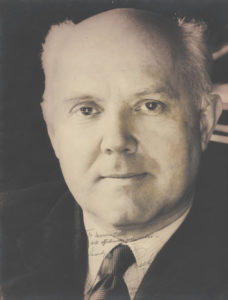
Filar had doubts about whether to continue in music or to pursue his interest in the field of medicine, and he thought that he needed to have his playing assessed by a great musician to inform his decision. A colleague who knew Walter Gieseking gave him a letter of introduction and despite his trepidation, Filar showed up unannounced on the pianist’s doorstep at 24 Wilhelminenstrasse in Wiesbaden. The German pianist was not immediately welcoming, stating that he had stacks of letters from pianists hoping to have an audience with him, to which Filar innocently replied, “But have you answered all of those letters?” Although Gieseking smiled at this answer, he continued to admonish the young Pole for not writing first and refused to hear him, but seeing the tears in Filar’s eyes, he relented and asked him to play for him. After some Bach and Mozart, Gieseking asked for Chopin, “since you’re Polish.” After Filar finished Chopin’s G Minor Ballade, Gieseking hugged him and said, “You want to give up the piano? You must be crazy. You are already a concert pianist. Would you like to study with me? Do you think I can teach you something?” Filar was beyond delighted and when he brought up how to pay him, Gieseking replied, “You’ve already paid enough. Come every Thursday at 10:30…. Just ring the bell and come in.”
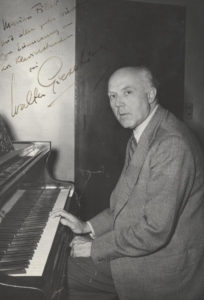
Thus began a five-year apprenticeship and a congenial relationship of great mutual admiration. Filar states in his book that recordings do little to reveal the wonder of Gieseking’s incredible singing sonority, adding “I learned my singing tone from Mr. Gieseking. I didn’t have it before. How could I have had it? I had never heard anything like it!” The great German master held his student in the highest esteem too, praising his Chopin to the skies, telling his wife “Filar studies with me and he plays the Barcarolle better than I do” (Gieseking’s wife listened to Filar play it for her and she agreed). At a recital for the American Red Cross in Frankfurt, Gieseking pointed Filar out to the audience and begged him to play Chopin’s A-Flat Ballade then and there, but the mortified young pianist was too shy to do so. Gieseking wrote several letters of introduction for Filar and had him engaged to play in Lisbon for the centenary of Chopin’s death: “They asked me if I knew somebody who played Chopin well. Since Arthur Rubinstein can’t be everywhere at once, you’re going!” He was thereafter booked for other such engagements, including playing on the centenary date of Chopin’s death with Abendroth in Berlin.
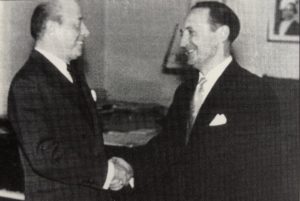
After his mentorship with Gieseking, Filar moved to America, arriving in New York on March 3, 1950 on the American military ship General Greeley. He took English lessons and attended concerts, meeting a former classmate at a Carnegie Hall concert a month after his arrival, who then introduced him to some important people. The husband of a former classmate was responsible for setting up the summer schedule in Chautauqua and he was so impressed by what he heard at a dinner gathering that he crossed out the name of the one artist whose contract had not yet been signed so that Filar could take her place. He also auditioned for Ormandy, who was a bit brusque but later wrote to engage the pianist in Beethoven’s Choral Fantasy – the pianist didn’t know the work and considered not accepting, but gave in at the insistence of his friends. He considered the applause after the first performance to be tepid but Ormandy assured him that this was indeed a rapturous reception. The response was so ecstatic at his January 1, 1952 Carnegie Hall performance with Ormandy of Chopin’s F Minor Concerto that the pianist was aware he had been well received.

Despite great acclaim for his performances and some high-profile bookings, Filar was unable to secure management in the US. While some joked that he didn’t need any because of his success with bookings on his own – which required no need to pay out commissions – he hoped to have representation, but it appears that the all-powerful Sol Hurok put a stop to that. On their first meeting in Paris, Hurok had accused Filar of studying with a Nazi, which led the young Pole to defend Gieseking by pointing out that he played music of Jewish composers and had a Jewish manager, in addition to their own close relationship – as well as the fact that he had been cleared by US Army Intelligence. While his audition went well enough that Hurok expressed some interest in him, Filar did not like the impressario’s haughty attitude. Once he moved to New York, no other manager would touch him as Hurok had him blacklisted. When Arthur Rubinstein introduced Filar to Hurok in his own dressing room after a recital, the manager made a sour face and walked out.
Filar would continue to play internationally and in the US, where he became a citizen, but his energy would be primarily focused on teaching. He began teaching at Settlement Music School (which was linked to Curtis), heading their piano department from 1953 to 1966, before becoming full professor at Temple University’s College of Music from 1973 to 1989. His many students continue to refer to him with the utmost adulation, his presence in their lives having had a most profound impact. Beth Levin, Charles Birnbaum, and Lambert Orkis have all spoken and written about their great mentor with reverence, both about him personally and professionally. Levin states that as a child, she “didn’t realize the great drama that was going in front of my eyes with Mr. Filar- coming to Philadelphia, teaching night and day, trying to play more,” while Birnbaum referred to Filar as “one of those unknown gems, as far as the U.S. was concerned. What should have been an absolutely amazing concert career stalled in the U.S.”
Filar threw himself into his teaching, and Levin states that he was involved in their education in very personal, almost parental way: he would show up before their recitals to help them warm up and he would call them afterwards with bits of advice (on one call, he told Levin’s mother “She must get her hair out of her face!”). While he could be ruthlessly direct in his observations as a teacher, it always came from a place of caring and he always aimed to emphasize the positive, Orkis recalling one of his own performances when Filar was more enthusiastic and supportive than he was, how warm he was in his encouragement.
Despite his lack of management, Filar still played internationally albeit not with a full concert schedule. This 1976 recital in Brazil – never before released – shows that his pianistic and interpretative powers remained undiminished.
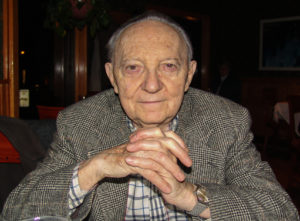
After his retirement from Temple in 1988, Filar continued as Professor Emeritus at the Boyer School of Music and Dance and even returned to Poland in 1992. While he stayed relatively active, over time his health waned and sadly he developed Alzheimer’s: Levin and her teacher shared a birthday, and she knew things were in decline the year that he had forgotten that fact in their annual birthday phone call. He spent his last years living under the care of his dedicated pupil Charles Birnbaum until he passed away on July 10, 2012 at the age of 94.
Because Filar did not leave behind a substantial recorded output, he is less remembered than many of his contemporaries. He made radio broadcasts in post-War Germany, as did many artists of the day, and some of these have finally been released by the great label Meloclassic (click here). As far as official commercial recordings go, he appears to have made only two LPs in 1951 for the small Colosseum label, which was run by a former colleague from Poland who was also living in the US. While the discs received very positive reviews, the small label had limited distribution and once the discs were out of print there was no real means for them to be reissued. The playing is very fine indeed, with Filar’s beautiful singing tone wonderfully captured in his readings of six Chopin Nocturnes, with the ringing singing sonority that he perfected with Gieseking not long before these performances were set down:
Filar’s Colosseum recording of Chopin’s B Minor Sonata features his tremendous capacity to play with both strength and sensitivity, with a strong rhythmic pulse that is never aggressive despite its remarkable momentum.
While it is Chopin for which Filar is predominantly known – Levin states that she believes that it is his love for this composer that allowed him to survive – his Colosseum LP recording also featured works by Szymanowski: very fine accounts of the Four Preludes Op.1 and Etude in B-Flat Minor Op.4 No.3 that reveal his beauty of tone, clarity of texture, and lyrical phrasing.
Chopin’s Piano Concerto No.1 in E Minor was a mainstay of the pianist’s repertoire: Filar played it at key points in his career and as an audition piece for several major figures throughout his life. This October 15, 1953 concert performance accompanied by Erik Tuxen and the Danish Radio Orchestra captures the pianist’s playing at its poetic and energetic peak, with a wonderful blend of vitality and poetry, his rhythmic impulse and stunning technique serving the lyricism of the work with sumptuous phrasing, refined nuancing, and natural but emotive timing.
As much as Filar is associated with Chopin, his repertoire was vaster: there are live recordings of him playing concertos by Mendelssohn, Schumann, and Tchaikovsky, as well as the superb Beethoven Piano Concerto No.3 in C Minor presented below. His playing here too features his sumptuous singing sound, masterful use of the pedal, and rhythmic vitality.
Finally, here is an opportunity to hear the great artist in spoken word (though you can hear him speak in the Brazil recital posted above): the link below will take you to three interviews with Filar about his experiences in the war, much of which is explored in his book. As captivating as his book is (and again, I cannot recommend it highly enough), the oral history below is fascinating as one can hear directly from Filar himself the extraordinary experiences he went through. The interface is a little counter-intuitive: once you have heard part 1, click on the icon in the top right of the player window to open up the option to hear parts 2 and 3. The link is here: https://collections.ushmm.org/search/catalog/irn508654
Filar’s life was certainly remarkable – definitely worthy of a movie on the same lines of The Pianist – as is his pianism, and he lives on in the memories of those who knew and studied with him and now through the circulation of his too-few recordings. Orkis reflects that “to know that he escaped the horrors of the war and eventually played with the Philadelphia Orchestra in Carnegie Hall gives me the daily hope that whatever obstacle I may face, the possibility of better circumstances is always plausible – indeed, his example as a being seems to have opened up the world of what is possible to his students and listeners.” As the artist himself stated, “My life was not ended by the Nazis, although they took much of it away by murdering most of my family. My life went on. I was and am a musician, a teacher, a performer and a concert artist who has had a long international career. And that life, too, is part of my story.”
His is indeed a story worth remembering – as is his supreme artistry.
My deepest gratitude to Beth Levin, Lambert Orkis, and Charles Birnbaum for sharing memories and photographs of their great mentor, with a special thanks to Mr. Birnbaum for having provided the recorded performances presented here, many of them now publicly available for the first time.


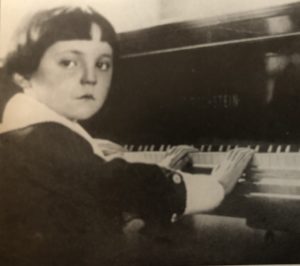
Recent Comments